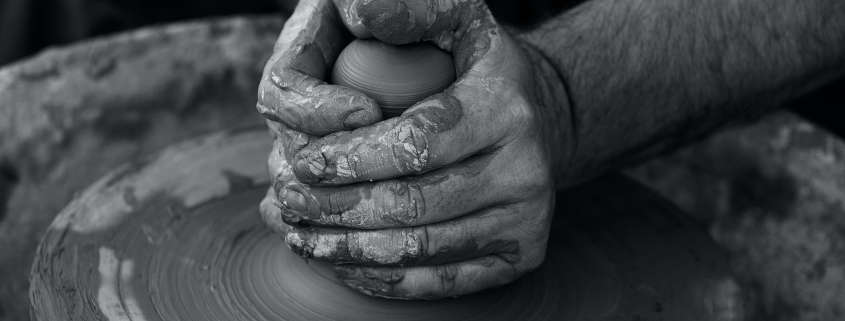The Master’s Touch – A Journey from Clay to Grace
“I consider that our present sufferings are not worth comparing with the glory that will be revealed in us.”
– Romans [8:18] (NIV)
I recently came across, The “Teacup Story”, which is on the surface an amusing story about a fictious tea cup and its personal journey from clay to a beautiful piece of art. As I read about the teacup and how it is made, I realized it also serves as a poignant allegory for the intricate, often challenging process of personal transformation and refinement. Just like the teacup, every individual undergoes a series of trials and tribulations, each serving a purpose, molding us into the beautiful, resilient creations we are destined to become. The narrative is a delicate intertwining of struggle and beauty, echoing the timeless message embedded within the biblical text of Romans [8:18] (NIV): “I consider that our present sufferings are not worth comparing with the glory that will be revealed in us.”
In the story, a couple stumbles upon a teacup of exquisite beauty, oblivious to the strenuous journey it endured to acquire such elegance. The teacup’s testimony of its metamorphosis from a piece of red clay into an object of admiration mirrors our life’s journey, riddled with difficulties yet purposeful, aiming towards spiritual and personal refinement.
The teacup, throughout its metamorphosis, recounts a series of intensive steps to the couple. Initially, the master’s hands rolled and patted the clay, testing its resilience. This was followed by a dizzying spin on the wheel, testing its balance and core strength. Subsequent to that was its trial by fire, not once but twice, inside scalding ovens. The first bake solidified its form, and the second intensified its durability. Amidst these stages, it endured the overwhelming fumes of painting, a process that instilled in it vibrant colors and a captivating design.
After each step the teacup asked the potter, “Am I done?” The potter would reply, “Not Yet!” Until the final the time in the scalding oven, when the potter told the teacup “Now you are done!”
Every phase of the teacup’s transformation is akin to life’s challenges. The rolling, patting, spinning, and intense heat symbolize life’s pressures, losses, and trials. We often find ourselves echoing the teacup’s pleas – yearning for relief, a cessation of the unyielding trials that life hurls our way. Yet, just like the skilled craftsman in the story, God’s silent, reassuring whisper of “Not yet” is a reminder of His grand design – a masterpiece in the making.
The trials are neither arbitrary nor cruel; they are essential strokes of the Master’s brush, imparting strength, resilience, and vibrancy to our character. The craftsman’s persistent yet purposeful methods underscore a profound truth – every challenge endured and every obstacle surmounted contributes to whom we become.
Romans [8:18] offers solace and perspective amidst trials. Our present sufferings, intense and overwhelming, are transient phases under the Master’s skillful hands. Each trial, though painful, is a precursor to an unveiling of a glory, a beauty, and a strength that far outweighs the tribulations. The verse illuminates our understanding of trials not as arbitrary cruelties but as necessary steps towards an unveiling of an intrinsic glory embedded within our beings.
As the teacup emerges, radiant and exquisite, we too emerge from our trials with refined beauty and strength. Each challenge is a kiln of refinement, each tribulation a chisel sculpting us into beings of profound resilience and grace. The craftsman’s assurance, “Now you are a finished product,” echoes the silent yet profound assurance that every trial is not a destination but a passage, not an end but a transformation.
The teacup’s journey is not just an illustration of transformation but a profound narrative of hope. Each stroke of adversity is a brush of refinement; each moment of trial is a step closer to unveiling a masterpiece. Like the teacup, we are under the watchful, skillful eyes of the Master Craftsman – God – being molded, not marred; refined, not ruined; and transformed, not tarnished. Each “Not yet” is a whisper of hope – a promise of a masterpiece in the making, echoing the eternal assurance that our present sufferings pale in comparison to the glory that awaits us.



